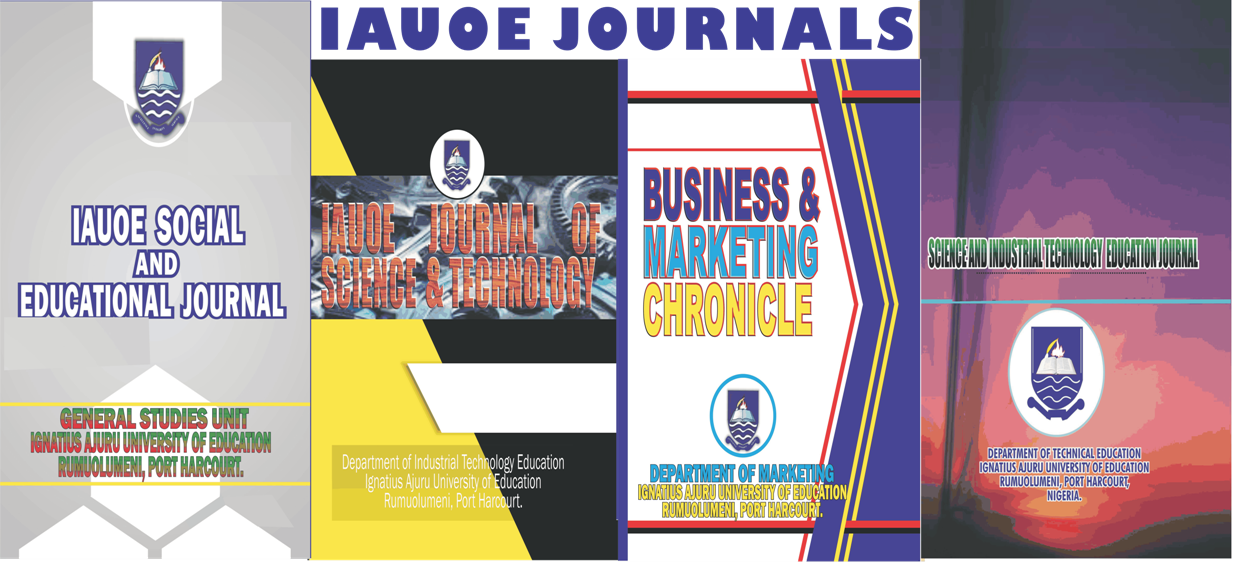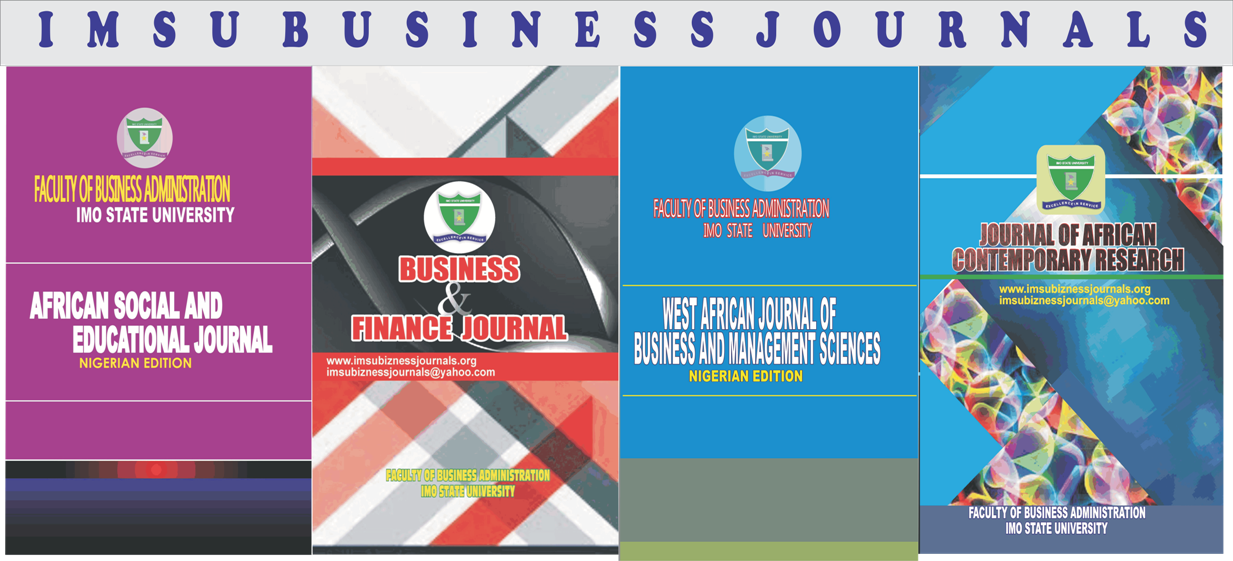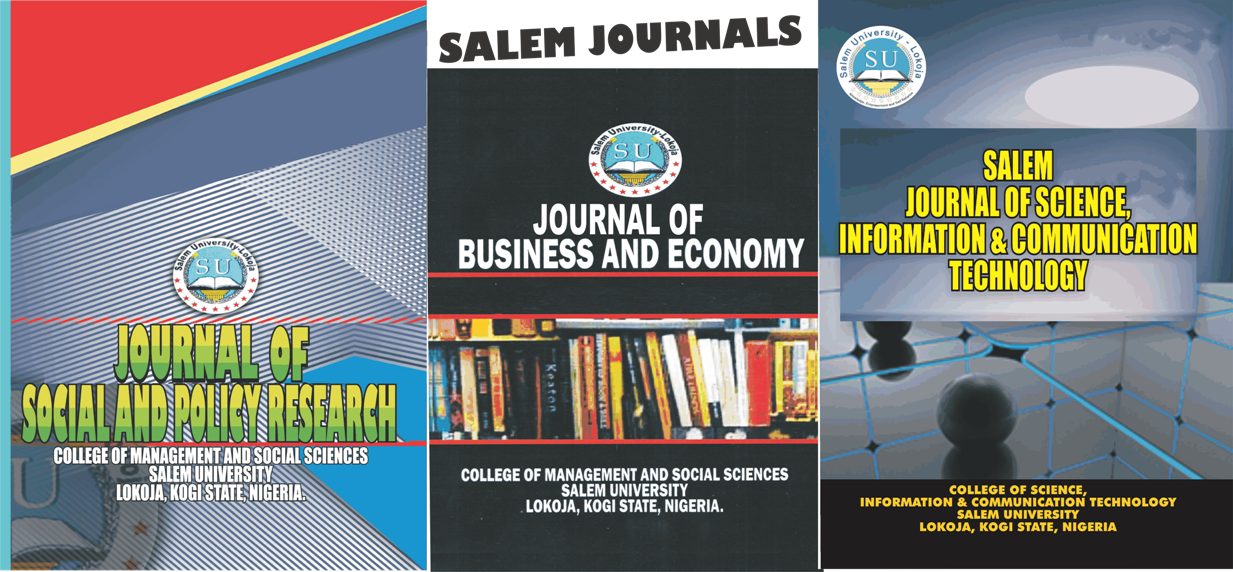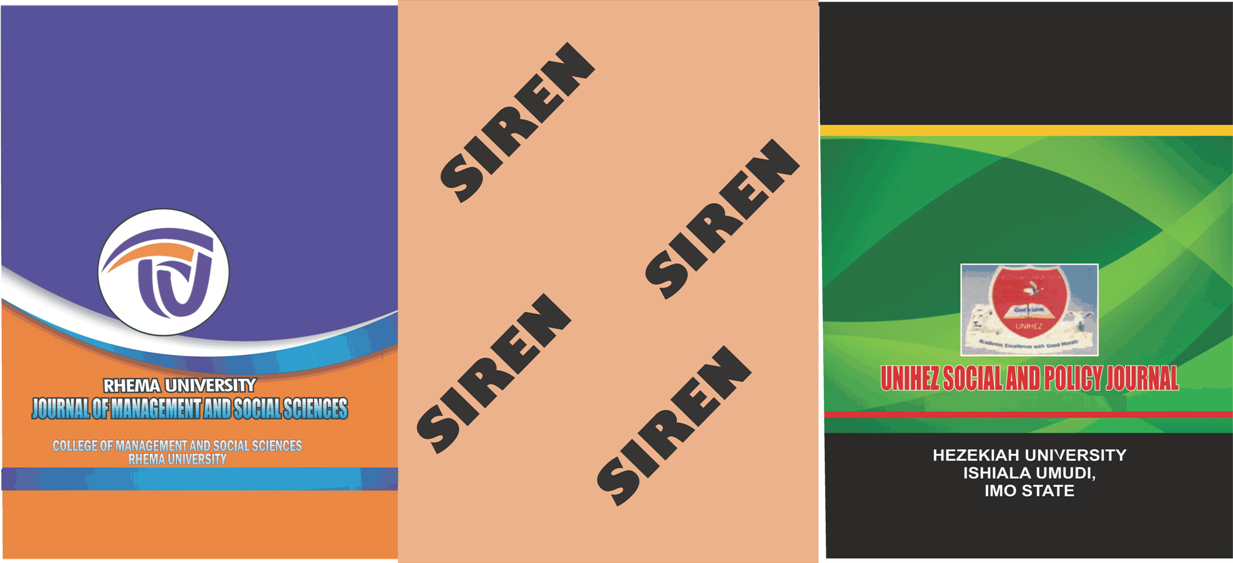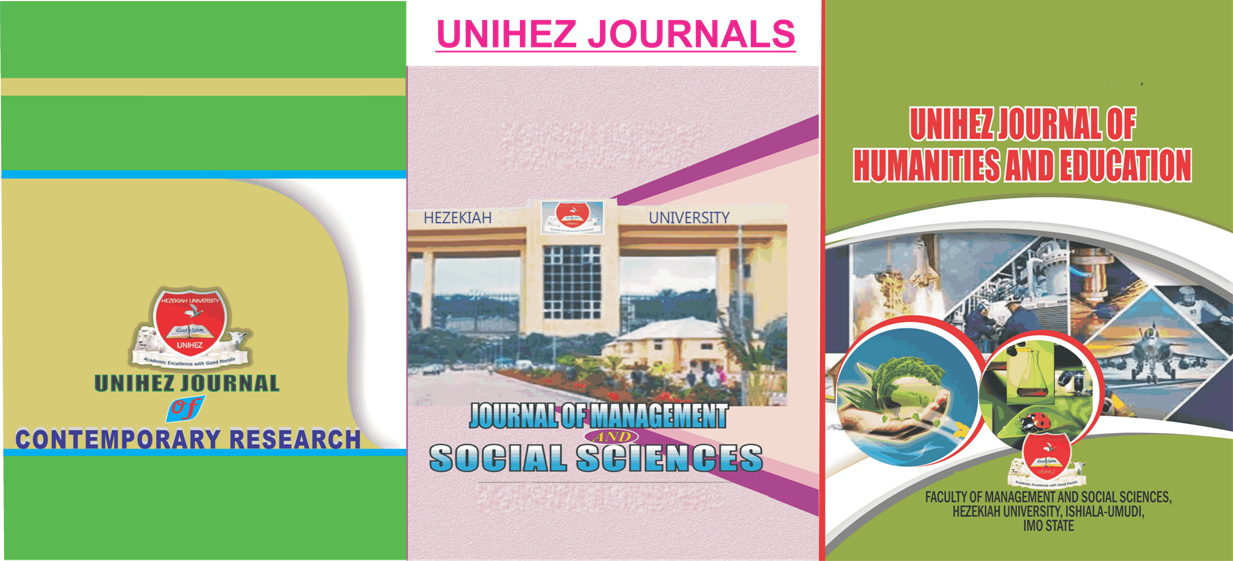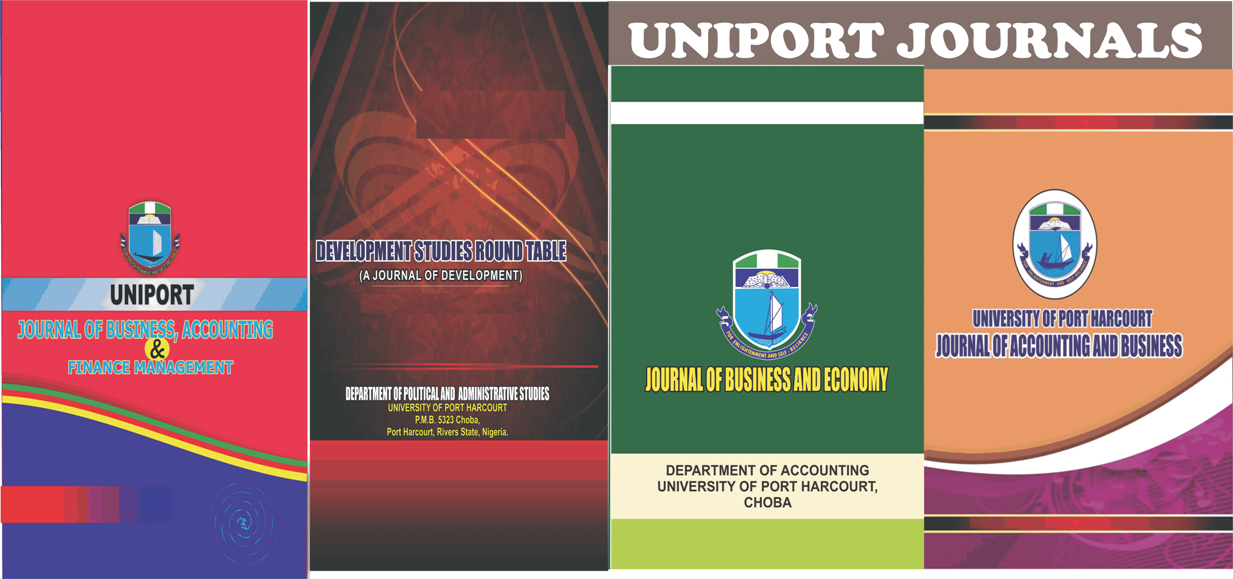2021 Archive
| 1 |
Title: AUDIT QUALITY AND ACCOUNTING GOING CONCERN EVIDENCE FROM LISTED NON-FINANCIAL FIRMS IN NIGERIA.pdf Author: Egolum, Priscilla Uchenna & Ezeh, Augustina Abstract: Abstract The aftermath of financial scandals such as those recorded for Enron, WorldCom in the USA and other world class companies has led to the identification of a perceived “expectation gap” in audit quality culminating to a call for changes in the auditing profession. Based on the theory of inspired confidence, this study examines the effect of audit quality on accounting going concern. Specifically, this study explores two key measures of audit quality by making use of a sample of thirty-eight (38) listed manufacturing firms in Nigeria for the period ranging from 2013 to 2018. Audit quality proxies that were considered in this study includes; audit fee and audit firm size which represented the independent variables while accounting going concern (dependent variable) is measured in the framework of Altman Zscore index and firm leverage served as a control variable in the specified model. In this study, hierarchical regression analyses technique is been employed to evaluate the panel data set that were collated from annual financial reports of the sampled manufacturing listed firms. The finding indicates that audit firm size indeed does improve the going concern status of the firm during the period under investigation. This finding translates to support the view that non-audit services such as audits of employee benefit plans, as well as consultations concerning financial and tax planning provided by big four audit services help to improve a firms’ going concern status. Therefore, it is recommended that management of manufacturing companies may consider hiring big4 auditing firms as they are better equipped to audit complex accounting information thus improve audit quality which translates into improved going concern status of the firm. Keywords: Audit Quality, Accounting Going Concern, Altman Zscore, Hierarchical Regression View |
| 2 |
Title: MPACT OF ELECTRICITY CONSUMPTION ON MANUFACTURING OUTPUT IN NIGERIA.pdf Author: Esther O. Lawal PhD. & Emmanuel Owoicho Abstract: Abstract The study analyzed the impact of electricity consumption on manufacturing sector performance in Nigeria. Annual time series secondary data over a period of 38 years, covering 1981 to 2019 was analysed using Vector Error Correction Model (VECM) and Johansen cointegration technique. The study concluded that, the low level of electricity consumption hampers the growth and development of the Nigerian manufacturing sector. There should be adequate funding of the power sector, security of gas supply, maintenance of existing power supply infrastructures. Alternative sources of energy for electricity production must be prioritized by the Government to reduce reliance on fossil fuel and thermal. Other renewable energy sources such as solar, biomass and wind can be used to generate power for socioeconomic electrification. Keywords: Manufacturing, exchange rate, capital expenditure, co-integration, Renewable Energy View |
| 3 |
Title: ELECTRONIC AUDIT EVIDENCE AND QUALITY OF AUDIT REPORT A REVIEW OF COVID-19 REGIME.pdf Author: Owolabi Sunday PhD. & Osunsusi Akeem Kolawole Abstract: Abstract The size of business transactions and volume of accounting information desires have necessitated new innovations to handle accounting information that is accurate and credible. Studies have shown that providing a high volume of accounting information that is credible and reliable is complex and largely depends on the quality of audit evidence which electronic audit evidence has the capability to provide particularly from the COVID-19 regime where audit evidence was remotely provided. This study examined electronic audit evidence and the quality of audit reports, a review of the COVID-19 regime. In carrying out this, the study employed a systematic exploratory research design, using sourced material documents from accounting and financial reviews, Journals, periodicals, and other relevant materials. The study systematic review revealed that electronic audit evidence in supplementary roles, is capable of enhancing the quality of audit, considering the COVID-19 regime where audit evidences were remotely provided. The study recommended that auditors should appreciate the fact that effective audit evidence should be pursued with all professional diligence, skepticism, and skillful to ensure that quality audit evidence is obtained since detailed and quality audit evidence is a panacea to credible and reliable financial statements capable of adding economic value to users decisions. Keywords: Accounting information, Auditing, Audit quality, COVID-19, Electronic audit Evidence, Quality of audit report. View |
| 4 |
Title: STATE INTERNALLY GENERATED REVENUE AND HUMAN CAPITAL SUSTAINABILITY; A CASE STUDY OF LAGOS STATE BY.pdf Author: Owolabi T. J PhD, Adefisoye Adekunle & Busari Tajudeen Abimbola Abstract: Abstract Sustainability concept should be one of the watchwords in public sector when it comes to the provision of social amenities to the citizen as it enhances more quality services. Provision of qualitative education and ensuring that the citizens have access to learning in a conducive environment is one of the major functions of the state governments in Nigeria. Sustainability of education can only be achieved through the proper management of the internally generated revenue (IGR) by each state in the country. This study examined how the internally generated revenue has contributed to the human capital development and its sustainability. The human capital development is measured using capital expenditure incurred on education in Lagos state from 2000-2020. For the purpose of this study education is used as the proxy for human capital development.This study employed ex-post factor research design. Population and sample size comprised the entire IGR and capital expenditures on education sector by Lagos state government from year 2000-2020. Audited financial statements of the state for the periods were gathered from the office of the Accountant General of the state. The data were analyzed using correlation and Ordinary Least Square regression method.The findings showed that the internally generated revenue has a significant positive effect on the sustainability of education in Lagos state while other internally generated revenue like fees and fines imposed by the state government has an insignificant negative impact on the sustainability of education in the state. In conclusion, it was gathered that Lagos state has been efficient in the utilization of its IGR towards the sustainability of education in the state. The study recommended that education sustainability should be recognized as an integral part of Human Capital Development and Sustainability Goal of all the states in Nigeria. Keywords: Sustainability, education, internally generated revenue, capital expenditure, human capital development. View |
| 5 |
Title: THE DRIVERS OF CORPORATE SOCIAL RESPONSIBILITY (CSR) A THEMATIC REVIEW AND NEW RESEARCH AGENDA.pdf Author: John E. Chikwe, PhD. & Ibekwe Wechie, PhD. Abstract: Abstract The major focus of this paper is to examine the corporate social responsibility drivers and related thematic reviews in line with business operating environment conducive sustainability and new research agenda. The fundamental drivers are observed to be market-based, and usually begin when a firm perceives or anticipates or responds to a risk associated with the socio-economic or environmental impact of a specific business practice. Some fundamental corporate social responsibility drivers were also identified and they include, economic, social, political, environmental awareness and sustainability, cultural, traditional, ethics, stakeholders’ activism, products, services, and consumer’s imperatives perspectives. Some other drivers and new research agenda identified include community-company integration and sustainability, human and material resources safety and sustainability, education and skills acquisition, social and health infrastructure development, and economic empowerment and development. The study found and concludes that, the above mentioned corporate social responsibility drivers have contributed immensely in corporate social responsibility pursuit. Since corporate social responsibility activities are evolving phenomena, the study recommends that corporate organizations should sustain the drivers and identified new research agenda in order to enhance corporate image and conducive community-company integration sustainability. Key words: Corporate Social Responsibility; Drivers; Thematic Review; New Research Agenda; Environmental Sustainability Stewardship. View |
| 6 |
Title: EXCESS LIQUIDITY IN NIGERIA’S ECONOMY A CLOG ON EFFICIENT MONETARY POLICY IMPLEMENTATION.pdf Author: Ifeanyi S. Mgbataogu PhD. & Chukwudi C. Omire PhD Abstract: Abstract The Study Sets Out To Investigate The Contributory Factors To The Preponderance Of Excess Liquidity As Well As The Effect Of Excess Liquidity Phenomenon On Nigeria’s Economic Performance. Relevant Secondary Data Are Sourced From The Central Bank Of Nigeria’s Statistical Bulletin. The Auto Regressive Distributed Lag (Ardl), Was Employed To Carry Out Econometric Analyses. The Findings Reveal That That All The Variables Except Private Sector Credit Account For The Presence Of Excess Liquidity. One Major Inference To Be Drawn From The Findings Therefore Is That Nigerian Economy Is Riddled With Lots Of Cash Outside The Banking System Which Are Poorly Utilized For Productive Activities. We Thus Recommend Among Others That The Authorities Should Fashion Out More Effective And Efficient Way Of Curtailing The Huge Amount Of Cash That Reside In The Hands Of The Non-Banking Public. It Is Imperative And Instructive Too That The Monetary Authority Should Sustain Its Current Contractionary Monetary Policy Stance To Mop Up Excess Cash In The Domestic Economy. Keywords: Excess Liquidity, Foreign Exchange, Money Supply, Auto Regressive Distributed Lag (Ardl) View |
